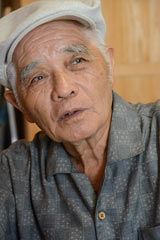Anti-war landowner Zenyu Shimabukuro refuses to provide his land for U.S. military use

On May 18, 1977, Zenyu Shimabukuro tilled his land in Camp Shields and placed a sign saying: “To the Defense Facilities Administration Agency and the U.S. Military, this is my private property. No unauthorized persons beyond this point.”
May 15, 2012 Kenta Masuda and Ryota Shimabukuro of Ryukyu Shimpo
Farmer and anti-war landowner Zenyu Shimabukuro, who owns land inside Kadena Air Base and Camp Shields, continues to refuse to provide that land for military use. He says, “A radish and a bomb may have a similar shape, but a radish doesn’t hurt anyone. The land is to be used for cultivation of crops not to kill people. That’s the way Okinawa used to be.” He imagined a green landscape on the island where military bases have stayed for 40 years since the reversion.
Now 75 years old, in May 1977, Shimabukuro started plowing his field in Camp Shields with heavy machinery. The National Diet was thrown into disorder when the Special Measures Law for Land Used by the American Forces, which had enabled the military use of the land, expired, four days were left undetermined for the use of the land. Shimabukuro said “There was no law governing this and the land is for the Uchina people.” So he took his wife, children, and ducks with him, Shimabukuro entered the base and started plowing the land. The military personnel were dumbfounded as he transformed lawn into a field with heavy machinery. When staff of the Defense Facility Agency told him how beautiful the lawn was, Shimabukuro replied that to him it was just weeds and went ahead and planted garlic in the newly created field.
At his house in Chibana, Okinawa City, Shimabukuro still keeps a bell made from a gas canister that was used to ring in an emergency during the time of the U.S. military administration when U.S. soldiers acted violently in the community.

On May 11, 2012 in Okinawa City, Zenyu Shimabukuro talked about the 40 years that have passed since the reversion.
His refusal to offer the land to the U.S. military has its origins in land seizures in Isahama, Ginowan Village in July 1955. At that time, Shimabukuro was attending Chubu Norin High School studying to become a farmer. One afternoon, he witnessed how U.S. military heavy machinery was used to seize and flatten fields despite residents’ opposition. He remembers feeling as though his dreams had also been squashed. U.S. military personnel with heavy equipment gathered in the middle of the night and the land was seized in the early hours of the morning.
After graduating from high school, Shimabukuro went to Hawaii on a scholarship from the U.S. Civil Administration to study agriculture. This made him feel closer to the United States, but after he returned to Okinawa, on June 30, 1959, a military aircraft crashed into Miyamori Elementary School in Ishikawa. The next day, Shimabukuro rushed to the site and on the ground saw glass Coca Cola bottles deformed by the heat. He imagined how incredibly hot it must have been for the people who died. He has never drunk Coca Cola again.
He brought the glass from a Coca Cola bottle back home and started keeping records of major accidents and crimes by the U.S. military since the Battle of Okinawa. The record or these kept as a scroll now exceeds 20 meters in length, and he is on to the second one. Accidents and crimes caused due the presence of the military still kept recorded despite the reversion of Okinawa to Japanese sovereignty.
At the end of last year, one event vividly reminded Shimabukuro of the land seizure in Isahama. It was when before dawn the Okinawa Defense Bureau submitted the environmental impact assessment report for construction of replacement facilities for the United States Marine Corps Air Station Futenma to the Okinawa Prefecture Government.
Shimabukuro said, “They aimed at the time just before dawn when their opponents were asleep, so the methods that they use to force through the construction of military bases have not changed at all.” Reflecting on 40 years since the reversion of Okinawa to Japanese sovereignty, he comments, “Things that have not changed after 40 years will not have changed even after 100 years. We hoped that the reversion to change the situation, but…. On the occasion of this 40th anniversary, we should also think about how everything started.”
(English translation by T&CT, Megumi Chibana and Mark Ealey)
Previous Article:Uruma resident feeds blue rock thrush by hand
Next Article:Large manbika fish served in Kitanakagusuku school lunches
[Similar Articles]
- Okinawa Coca Cola Bottling to issue special retro-design can to celebrate the 50th anniversary of the reversion
- 12,410 runners hit the streets on a clear and sunny day for the Okinawa Marathon
- Former politicians and teachers gather at Cape Hedo to discuss the reversion movement
- Asahi Shinbun feature article helps Kikukawa to encourage Okinawa under U.S military administration
- Okinawans’lives continue being threatened by U.S. military aircraft 73 years after WWII
 Webcam(Kokusai Street)
Webcam(Kokusai Street)


